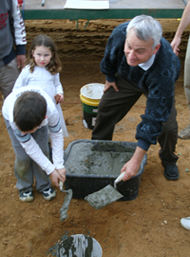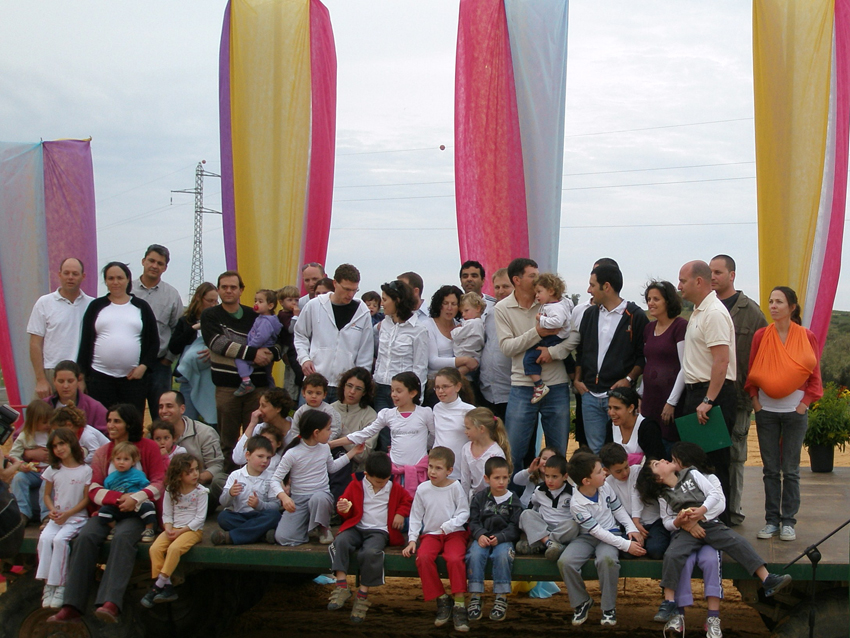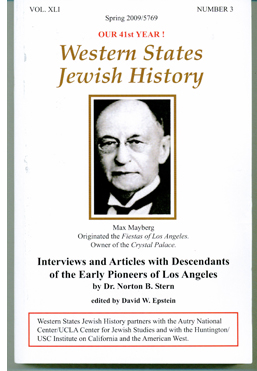
| |
Volume 3, Number 69 |
|
"There's a Jewish story everywhere" |
|
Today's Postings:
Monday, March 23, 2009
{Click on a link to jump to the corresponding story. Or, you may scroll leisurely through our report}
|
INTERNATIONAL
Israelis asking whether Gaza civilians were abused ... by Rabbi Dow Marmur in Jerusalem
Irving Greenberg, one of the significant Jewish thinkers of our time, has written: “Exercise of power must be accompanied by strong models and constant evocation of the memory of historic Jewish suffering and powerlessness. READ MORE
Intense history, politics frame an Israeli weekend ... by Ira Sharkansky in Jerusalem
Our weekend began with a reminder of Jewish history. READ MORE
Private families to build homes on kibbutz grounds in new settlement effort in northwest Negev Desert ... by Ulla Hadar in Kibbutz Ruhama, Israel
There is a new group of pioneers calling themselves by the acronym “Sabar” for Sairim (Young people), Bocharim (choosers) Ruhama. The acronym is apt because the “sabar” or sabra cactus has become a metaphor for native-born Israelis, prickly on the outside, but soft on the inside. READ MORE
Palestinian refugee resettlement key to Middle East peace ... by Isaac Yetiv in La Jolla, California
Albert Einstein defined insanity as “doing the same thing over and over again and expecting different results.” The century-old Arab-Israeli conflict provides a vivid and tragic illustration of this observation. READ MORE
NATIONAL
Crocodiles,wildebeests, and economic Darwinism ... by Sheila Orysiek in San Diego
After the tumult of the last election and the subsequent actions of the new administration (a growing disaster in my opinion), I decided to give myself a break and fled from the news channels to the saner precincts of the Animal Planet channel. READ MORE
JEWISH HISTORY
Western States: A story of Sen. Barry Goldwater's Jewish family READ MORE
San Diego County: Adventures in San Diego Jewish History—November 14, 1952:
Fund Announces 1952 Drive Second Largest in History READ MORE
Daughters of Israel READ MORE
Odds and Ends READ MORE
United Jewish Fund Nineteenth Annual Meeting Set for Dec. 14 READ MORE
JEWISH INTERNET FAVORITES
We continue our examination of Jewish entertainers
Kitty Carlisle Hart remembered in tribute VIEW VIDEO
Lorne Greene as Ben Cartwright in "Passion for Justice" episode of Bonanza VIEW VIDEO
Go to top of right column
|
|
Paulette Goddard as Loxi Claiborne in "Reap the Wild Wind"VIEW VIDEO
Sid James as King Henry in "Carry on Henry" VIEW VIDEO
COMMUNITY WATCH/ ADVERTISERS NEWS
Lawrence Family JCC: Lectures on Jewish Composers Next at Festival READ MORE
TODAY'S ADVERTISERS
A&B Gefilte Fish see coupon
America's Vacation Center
Anti-Defamation League
Balloon Utopia
Carol Ann Goldstein
Congregation Beth Israel
Jewish Family Service
Lawrence Family JCC
San Diego Community Colleges
San Diego Jewish Academy
San Diego Jewish Chamber
Seacrest Village Retirement Communities
Soille San Diego Hebrew Day School
Tifereth Israel Synagogue
United Jewish Federation
XLNC-1 Radio
STAFF BOX
Laurel Corona, who has been writing some wonderful columns for San Diego Jewish World, lectures at 1 p.m. tomorrow at San Diego City Collge's Faculty Dining Room on The Four Seasons, her new novel on Vivaldi's Venice.
DEDICATIONS
Each day's issue may be dedicated by readers—or by the publisher—in other people's honor or memory. Past dedications may be found at the bottom of the index for the "Adventures in San Diego Jewish History" page.
NOTE
PLEASE HELP US POLICE THIS SITE: If you see anything on this site that obviously is not in keeping with our mission of providing Jewish news and commentary, please message us at editor@sandiegojewishworld.com, so that we can fix the probem. Unfortunately, large sites like ours can be subjected to tampering by outsiders. Thank you!
EMAIL HEADLINE SERVICE
|
|
|



FROM THE SIDELINES
Israelis asking whether Gaza civilians were abused
|
By Rabbi Dow Marmur
 JERUSALEM—Irving Greenberg, one of the significant Jewish thinkers of our time, has written: “Exercise of power must be accompanied by strong models and constant evocation of the memory of historic Jewish suffering and powerlessness. It is so easy to forget slavery’s lessons once one is given power, but such forgetfulness leads to the unfeeling infliction of pain on others.” He concludes: “Memory is the key to morality.” JERUSALEM—Irving Greenberg, one of the significant Jewish thinkers of our time, has written: “Exercise of power must be accompanied by strong models and constant evocation of the memory of historic Jewish suffering and powerlessness. It is so easy to forget slavery’s lessons once one is given power, but such forgetfulness leads to the unfeeling infliction of pain on others.” He concludes: “Memory is the key to morality.”
I often quote these words in response to events in Israel. They’re topical once again as the media carry news about alleged abuses by Israeli soldiers of Palestinian civilians during the Gaza operation. At this stage it’s impossible to determine whether the allegation is about one particular instance or a reflection of a general trend.
In view of what we know about war, nothing is impossible. Abuses have occurred in every war, not least in our time, and even in so-called peace missions, as in the case of Canadian soldiers in Somalia. The fact that conscription in Israel brings boys, at times not older than 18, to the battlefield increases the risk of immature action that may turn out to be immoral, perhaps even criminal. In this case, however, nothing has been proven yet.
We’d like to think that Jewish soldiers know enough Jewish history, some of it very recent, to “remember” what it means to be humiliated and annihilated. It’s a history that has shaped Jewish values to abhor the abuse of power under whatever circumstances. That such abuse may be commonplace elsewhere is no consolation for us.
I believe that a lot of the responsibility rests with the military rabbinate. Instead of instilling Jewish values it selects such texts for the soldiers that could encourage irresponsible acts in the name of God and in the guise of national pride. To invoke the Holocaust to justify cruelty perverts its lesson. Instead of training commanding officers to take responsibility for the actions of their soldiers by prohibiting abuse on both military and moral grounds, the rabbinate is too often too preoccupied with ritual trifles.
Instead of, for example, improving the quality of the military chaplaincy by taking it away from religious fanatics,
those in authority are prone to shoot the messenger instead of examining the message. Thus it has already been said
defensively that the man who leaked the allegations to the press is a known “lefty” and that none of
the soldiers who alleged abuse spoke about themselves; they all reported hearsay about others.
|
|
Whatever the circumstances and the background, at this stage we’re not entitled to draw definite conclusions. Women and men, Jews and non-Jews who, ahead of the evidence and on the basis of newspaper articles, organize protest marches and write indignant letters in all directions are making a case for those who say that negative reporting about Israel is a tool in the service of Israel bashing, an abuse that can be no less lethal than infringements by soldiers in uniform.
The leading Israeli newspaper Ha’aretz that broke the news and is pursuing the matter shows that Israel is an open, democratic society that’s prepared to look at itself, warts and all. Even those who think that the paper went overboard this time don’t want to collude with abusers but will argue for the publication of truths, however painful.
Those committed to Israel, not least Jews in the diaspora, must discipline themselves not to be unduly defensive by accusing everybody who demands a full inquiry of morbid Jewish self-hatred or blatant anti-Semitism.

|
|
|

LETTER FROM JERUSALEM
Intense history, politics frame an Israeli weekend
|
By Ira Sharkansky
 JERUSALEM—Our weekend began with a reminder of Jewish history. JERUSALEM—Our weekend began with a reminder of Jewish history.
There was a small gathering at the cemetery to remember Like Roos, a distant relative of Varda. She was a good friend, curious and willing to argue, but reluctant to get too close. The others who gathered at her grave, and then for coffee afterward, may have been able to give and receive more than we due to shared experiences of a European childhood at a bad time. Two of them, like Like, found refuge with Christian families in Holland. One spoke of a friend who was passed from family to family 18 times. Another was orphaned in Poland at the age of one, did not say how she spent the war, but told of being adopted in Philadelphia. Yet another was sent by the kinder transport to Wales.
The police were preparing for massive demonstrations in Jerusalem and Nazareth, where Palestinians would declare Jerusalem as their cultural capital. The event could be harmless, or the organizers and the police could make it ugly. "Cultural capital" sounds like a nationalist euphemism for something grander. Events would begin at 5:30 PM on Saturday, with dignitaries from Tunisia and the Gulf States. Plans were to fly the Palestinian flag on the Noble Sanctuary, which Jews call the Temple Mount. There would be protests about the municipality's intention to destroy homes built illegally on public land, and the home of a bulldozer terrorist who killed Jerusalemites.
Not much happened, suggesting that the Palestinians were showing their incompetence, or their unwillingness to do more than remind the world of their existence. Crowds gathered in Bethlehem and Ramallah. There were more police than demonstrators in Jerusalem. They blocked streets and arrested 12 Palestinians who would not desist.
A Jewish demonstration got underway after the Sabbath, at the tent across the street from the prime minister's residence where the Schalit family marked 1,000 days of Gilad's captivity. His father called on Ehud Olmert to do what is necessary to free Gilad during his remaining time in office. A well known author was more forceful. He accused Olmert of indifference and ineptitude. A woman demanded that Israel look after its soldiers. She threatened that the next generation of recruits would punish the country by their inaction if it did not bring all its soldiers home. The Schalits.left the tent, but said they would continue the pressure from their home in the Galilee.
This demonstration attracted prime time from the media, but no more than two or three hundred participants.
The standard of comparison is the gathering of 400,000 who protested the massacres of Palestinians of Sabra and Shatila in 1982. Even though it was Christian Lebanese militias that did the killing, an Israeli Committee of Inquiry concluded that Ariel Sharon had indirect responsibility for not anticipating and preventing them, and could no longer serve as Defense Minister.
Soon after a car bomb exploding at a shopping mall in Haifa. It was parked outside the mall, without passing through the inspection of cars that go inside. Fortunately there were no casualties. The explosion occurred in only one of several packets that the police found during three hours of disarming what remained. An Arab organization calling itself
|
|
Free the Galilee claimed credit, and promised something more successful.
There was also news of a crises in the Labor Party. Labor was dominant from before the establishment of the state until the election of 1977. It returned to power in the elections of 1992 and 1999, and filled senior positions in the current government. The party won 56 seats in its most successful election, in 1969. It declined to 26 seats in 1999, 19 seats in the elections of 2003 and 2006, and 13 seats in 2009.
Ehud Barak, who is party leader and Defense Minister, wants to bring Labor into the government being formed by Benyamin Netanyahu. The left wing of the party is strongly opposed to serving with Netanyahu, Avigdor Lieberman, and the ultra-Orthodox. Some members are threatening to withdraw and create a Social Democratic Party if Barak wins the votes necessary to bring Labor into the government. If Barak loses the vote, he may walk away and become Defense Minister without party affiliation. Whatever happens seems bad for the Labor Party.
Holocaust, Palestinians, and quarrels about how to deal with them and ourselves are central to the Israeli experience. Sometimes they are in the background, but never far away.



|
|
|

FROM THE GATES OF THE NEGEV
Private families to build homes on kibbutz grounds
in new settlement effort in northwest Negev Desert
|
By Ulla Hadar
 KIBBUTZ RUHAMA, Israel – There is a new group of pioneers calling themselves by the acronym “Sabar” for Sairim (Young people), Bocharim (choosers) Ruhama. The acronym is apt because the “sabar” has the same Hebrew root word as sabra, the cactus that has become a metaphor for native-born Israelis. They are said to be prickly on the outside, but soft on the inside. KIBBUTZ RUHAMA, Israel – There is a new group of pioneers calling themselves by the acronym “Sabar” for Sairim (Young people), Bocharim (choosers) Ruhama. The acronym is apt because the “sabar” has the same Hebrew root word as sabra, the cactus that has become a metaphor for native-born Israelis. They are said to be prickly on the outside, but soft on the inside.
These pioneers are not intending to become members of the kibbutz on the eastern side of Sha’ar Hanegev municipality, but are planning to move into new homes that the kibbutz will erect to earn income.
On March 19, kibbutz members and members of 20 families who will live in the homes held a ceremony attended by Sha’ar Hanegev Mayor Alon Schuster marking what participants called the “fifth settling on the land” and the 65th anniversary of the successful establishment of the kibbutz
On March 19, 1944, four years before the establishment of the State of Israel, settlers were able to activate Ruhama and keep the settlement going. Three times previously efforts to establish the farming community had ended in failure, the earliest one having occurred in 1911.
The kibbutz population grew after 1944, but an economic crisis in 1998 prompted many people to move from the community to urban areas, decreasing Ruhama’s membership from 350 to 220. Empty apartments of moved-away members were rented to students of Sapir College in the nearby city of Sderot as well as to young couples and families. Children’s houses—relics of the era when kibbutz ideology called for children to be raised in common—were converted into living quarters and were rented out.
In the last decade, some people who had left the kibbutz began returning with their families. Some of the returnees, in fact, were descendants of those who had founded the community in 1944.
Kibbutz members approved construction inside the kibbutz’s borders on land owned by the Israel Land Administration under the Ministry of Construction and Housing. It took five years to receive approvals from the various governmental authorities.
Mayor Schuster told attendees that he could not “emphasize enough the importance of this event. I like the young spirit that stands behind the whole process. When I address you—the members of the Sabar group—I don’t have to explain why you are building your future home in Kibbutz Ruhama; you have thought, reasoned and then chosen. The people of Kibbutz Ruhama and the municipality of Sha’ar Hangev stand behind you.”
|
|
 
The official noted that many of the 270 kibbutzim in Israel have undergone major changes, abandoning the collectivist ideology of their founders for privatizations. “This decision to build inside a kibbutz brings light and visin to the future,” Schuster said.
Kibbutz children fanned out among the kibbutz members, presenting roses to the elderly ones.When one child presented a rose to Schuster, the mayor responded: “I myself have to come to terms with the children’s decision to choose me as one of the elderly members.
Amit Ferdman of the Sabar group said: “Sixty five years ago on the 19th of March 1944, the founders, members and children set their feet on the ground that was to become Kibbutz Ruhama. Three months passed, and the well had been renewed, the tents plugged in and the first fields ploughed. Then another 100 members and a dozen children joined the first settlers. There was a great silence around, no trees, no protecting shade, but that didn’t prevent the group from joining in dancing to celebrate the founding of Kibbutz Ruhama.
“Ten years afterwards, the place was a real community with trees and lawns. A swimming pool was built—the first one in the Negev.”
Now, said Ferdman, “a neighborhood consisting of the twenty new houses is to be built where we stand. The kibbutz population young and old greets and blesses the families who have decided to build their future homes here.”
Members of the new families signed their names on a document that was placed in the ground and sealed in cement. It read: “The vision of the Sabar project: We see Ruhama as the place to build our home and raise our families. A place where we create together with the kibbutz population a joint community life including cultural events, social life, education and quality of life, along with economical and personal freedom.”
|
|
|

WAR AND LORE
Palestinian refugee resettlement key to Middle East peace
|
By Isaac Yetiv, PhD
 LA JOLLA, California—Albert Einstein defined insanity as “doing the same thing over and over again and expecting different results.” The century-old Arab-Israeli conflict provides a vivid and tragic illustration of this observation. We have seen the same movie played over and over again. But in the most recent version, the plot has thickened dangerously and the cast of characters present a no-exit situation for which the old remedies seem absolutely ineffectual. LA JOLLA, California—Albert Einstein defined insanity as “doing the same thing over and over again and expecting different results.” The century-old Arab-Israeli conflict provides a vivid and tragic illustration of this observation. We have seen the same movie played over and over again. But in the most recent version, the plot has thickened dangerously and the cast of characters present a no-exit situation for which the old remedies seem absolutely ineffectual.
In the last 60 years since the establishment of Israel, a dozen of U.S. presidents, Democrats and Republicans, have relentlessly devoted time, effort,and money to bring “peace” to the area to no avail. More than a dozen of Israeli Prime Ministers from the Left and from the Right offered substantive concessions to reach a modus vivendi with their neighbors without success. The “peace process” saw many “processors” and special envoys, and conferences at Camp David, Taba, Madrid, Annapolis; various programs and methodologies were tried ( Quartet, Road Map, Land –for-Peace, Two-state solution etc.), and all came to naught.
Why? I submit this is because the good-willed interveners have, for 60 years, taken the wrong approach, like a doctor who misdiagnoses a disease and follows a course of treatment totally inept and not-to-the-point. For decades we have been cajoling, indulging, humoring the Arab rulers with blatant diplomatic hypocrisy and a lot of money. This has only radicalized their masses, made Iran the hegemon in the Gulf, and sprouted tens of terrorist organizations.
There are three sides in the Middle-East conflict:Israel (and the Jews)- Palestinians (and Arabs) – U.S. (and the West). For an objective observer, more than once, Israel has yielded to pressure from the U.S. to make concessions to achieve peace. This effort has culminated in Camp David , in 2000, with President Clinton and P.M. Barak offering Arafat a generous deal , followed, a few years later, with the total unilateral evacuation of Gaza by PM Sharon. Both have proved disastrous for Israel and have made peace even more elusive because of the implacable rejectionist attitude of the Palestinians , tacitly acquiesced to by the Arab leaders. Time has come to ask them to change their ways.. Of course old habits die hard and I understand the difficulties of changing course abruptly, but we have now a president who heralded “Change we can believe in” and who is not averse to 180 degrees about-faces. Will he repeat the same “failed policies “ of his predecessors, as he seems to have done by sending George Mitchell , again, to talk? Or will he inaugurate a new policy of ‘tough love” by telling the Arab world the truth they never wanted to hear? I hope he chooses the latter.
The new approach in the Middle-East requires fresh and original thinking. Here are the contours of a New Mid-East Policy that has a chance to work:
First and foremost, resolve the refugee problem:
After WWII more than a hundred million refugees in the world have been settled peacefully among their peoples with whom they shared culture, religion, and language
(Hindus and Pakistanis, Germans in the Sudeten lands, Jews from Arab countries who were absorbed in the Jewish state, and others.) The only refugees who continue, after 60 years and three generations, to live in squalor and despair in refugee camps are the Palestinians. One of the worst blunders of the UN was to absolve the Arab world of any obligation to care for their brethren by establishing UNWRA, a well-meaning UN agency that has practically adopted the refugees , and their generations of offspring , by seeing to all their needs, thus creating an abject dependency.
The UN fed the refugees, clad them, sheltered them however precariously, educated them and even became their political advocate. The UNRWA is funded mainly by the West ( EU: 50% ; US:31%) while the wealthy Muslim countries provide only 7%. This UN tutelage has resulted in a population boom among the refugees with a concomitant financial burden on the donors who have already spent hundreds of billions of dollars. Freed from such parental obligations as feeding and housing their children, the adult population has plenty of time to dig tunnels, smuggle weapons, assemble missiles and fire them at the “Zionist enemy” thus inviting retaliation, which perpetuates the conflict and even escalates it and makes it unsolvable. In a way, not only Iran but also the West is financing the war by proxy. The UNWRA is, and has been for sixty years, a well-meant humanitarian enterprise that has degenerated into an unintended auxiliary instrument of war, victimizing those it was intended to help, the whole region, and world peace.
Let us not kid ourselves: There is no solution to the Arab-Israeli conflict before the refugee problem is resolved.. It is not only a humanitarian obligation to allow these human beings to live with dignity, but it is a sine qua non act of practical necessity. Recent history has shown that the refugee problem was the ubiquitous stumbling block that prevented agreement: Arafat at Camp David was given everything he wished for and some, but he could not bring himself to sign a peace treaty with Israel that does not recognize “the return of the refugees” to Israel proper, not to the new state of Palestine (a demand tanatamount to the annihilation of the Jewish state.)
The Saudi peace initiative of 2002, accalaimed by the West as “moderate and a good basis for negotiations” included the same demand, albeit vaguely sweetened. And even the so-called “moderate” Mahmoud Abbas, the leader of Fatah in the West Bank, never ceases to repeat the same non-negotiable demand . Even if it is just “lip-service” as some commentators believe, he is a prisoner of his pronouncements, as Arafat was before him, and he fears for his life if he “betrays his people.” Therefore, he will be the first to applaud the disappearance of that stumbling block.
Because it is axiomatic that the “right of return to Israel proper” is a non-starter as explained above, the only way to solve the Palestinian refugee problem is a huge Marshall-like program of resettlement of the Arab refugees among their own people, culture, language and religion.
We need not dismantle the UNRWA, as many experts have suggested, we need only to change the meaning of the letter R in the acronym: from relief to resettlement. All states in the area and beyond should contribute. This will be money well spent because it will restore dignity to the refugees, give them citizenship, and put them to work as productive members of society.
I remember one Arab writer in the early fifties , Sabri Jiryis, who castigated the then Arab leaders for keeping the refugees as a pawn and a weapon in their war against Israel. "The Jews," he said," have absorbed their brethren who left or were expelled from the Arab states, and the Arab states must settle the Palestinians within their own borders.” But his voice was drowned by those leaders who accused him of heresy and treason. This was six decades ago, and the world wishes they had listened to Jiryis. There would be peace today.
I am not deluding myself into thinking that this will be an easy feat. Those in the Middle-East who still believe that they can “wipe Israel off the map” will fight the idea
tooth and nail but they will have to explain why they are so eager to sacrifice their brothers for their illusory hope of destroying the Jewish state. But those who signed a peace treaty with Israel (Egypt and Jordan) or have quiet relations
Return to right column
|
|
with Israel (Gulf emirates, North Africa,and others), and the refugees themselves, have really no excuse in delaying the Resettlement.
While the disappearance of the refugee problem is absolutely essential for the achievement of a genuine peace, it must be accompanied with other measures to transform the Palestinian society from one glorifying death and martyrdom to one seeking peace and prosperity. At the present geo-political juncture, there is only one man who can begin to accomplish that, President Obama. Not only does he wield the power and the bully pulpit of the American presidency, but he also talked to the Muslim world about mutual respect and an extended hand of peace, even adding that “his family is Muslim,” which enhances his credibility with them, and allows him to show tough love and to tell them the truth on what ails them and how he is ready, willing ,and able to assist them. And the first thing is to solve the refugee problem. This will be his best gift to the Arab world.
He should tell the Saudis, in no uncertain terms, that they need to close the thousands of madrassas which inculcate Wahabi Islamic doctrines to the tender minds of the Arab youth, or to transform their curricula ,adding math, science, world history etc…Quietly but surely, they should be reminded that we have been protecting them at a huge cost, in blood and money, and we expect their unreserved cooperation, in their own interests.
Abbas and Fatah should be told categorically that their rhetoric of hatred,death,and martyrdom should cease; their school textbooks need to be re-written and purged of the venomous propaganda against Israel and America ( the only countries that can deliver anything to them) which they have been inculcating to their children, generation after generation. Schoolboys and girls have been officially “taught” that “the Jews are the sons of pigs and monkeys…” and that the highest achievement is “to die gloriously as a shaheed” a martyr. Today, films are shown at schools, mosques, youth camps…in which six-year-old boys and girls appear with all the accoutrements of a suicide bomber, chanting “poetry” of violence and death .
It is imperative that the leaders of the moderate Arab countries, our allies, pressure vigorously their muftis to issue a fatwa on the great sin of suicide which Islam ,as well as Judaism and Christianity, expressly prohibits. The Qur’an equates suicide with the denial of the oneness of God, which is an unforgivable sin ( " dhumb la yughfar lah" ), and no other consideration can make it halal , permitted.
I didn’t mention Iran, Hizballah, and Hamas as recipients of the campaign of truth because I believe it is useless. These are guided , and subservient to, a fanatical ideology of Islamic fervor that brooks no reform and compromise, and they should be dealt with differently. But if we succeed in reforming the moderates, the power and influence of the recalcitrants among the masses will dwindle to manageable proportions, and hopefully to oblivion. I believe these are achievable goals; they have not been tried before for many reasons not germane to the conflict and its resolution, such as the own interests of the “peace processors,” fear, political correctness, and because they didn’t believe the Arabs are reformable, which is not only the ultimate insult but a display of ignorance of the history of the Arabs who were for many centuries the bearers and purveyors of civilization in Europe and in the world.
As things stand now, without these reforms, any talk of a Palestinian state is premature and even detrimental to that same goal. An artificial state, concocted in haste before the resolution of the refugee problem and before a huge and sincere effort to re-educate the masses ,especially the children, is like spraying a coat of paint on rusted iron. Statehood per se is not a guarantee to peaceful behavior (see N.Korea, Iran, Syria, and others). An amalgam of tribes and militias fighting each other , bereft of democratic institutions, will not suddenly metamorphose into a peace-loving democratic society. Rather, it will become a seething irredentist agent of instability and even maybe a front of well-organized international jihadist movement, as Afghanistan used to be before 9-11 It will also be an international beggar state subsisting on the dole from the UN, the EU, and the US, an additional burden to the UNWRA already responsible for the perennial refugees.
Don’t we have enough with Afghanistan and Iraq that are bursting at the seams, and with nuclear power Pakistan in which Jihadist Islamism is ominously gaining power and influence? It boggles the mind to see the West, and especially the US, ardently exhibiting their delusory efforts to hasten the advent of a Palestinian state before the conditions are ripe for it. A Palestinian state today, whatever its configuration , is a menace to them no less than it is to Israel.
In her excellent book, The March of Folly, Barbara Tuchman quotes an historian who says about Philip II of Spain: “No experience of failure of his policy could shake his belief in its essential excellence.” For 60 years, and especially since Oslo in 1993, we witnessed a pattern of thought and policy that has failed lamentably. It is imperative that the main players in this dangerous arena ,and especially the United States, try something new, proactive, diametrically opposed to “business as usual,” which will stop the “march of folly” and engender a new generation of Palestinians that will replace the present implacable “conflict of ideology” with a reasoned “conflict of interest” more amenable to peaceful solutions.
|
|
|

REFLECTIONS
Crocodiles,wildebeests, and economic Darwinism
|
By Sheila Orysiek
 SAN DIEGO--After the tumult of the last election and the subsequent actions of the new administration (a growing disaster in my opinion), I decided to give myself a break and fled from the news channels to the saner precincts of the Animal Planet channel. However, the disasters there – while not self-inflicted (the animals don’t write the script under which they live) are nonetheless – horrific. SAN DIEGO--After the tumult of the last election and the subsequent actions of the new administration (a growing disaster in my opinion), I decided to give myself a break and fled from the news channels to the saner precincts of the Animal Planet channel. However, the disasters there – while not self-inflicted (the animals don’t write the script under which they live) are nonetheless – horrific.
One documentary was about the great wildebeest migration across Africa in search of pasturage. The key ingredient to survival is water and at every water hole danger in the form of predators awaits. But, a wary alert wildebeest has a decent chance of survival. At one point in the migration, however, they not only have to drink at the edge of a river alive with crocodiles but must also cross the river to continue their journey. The water is deep enough so they have to swim rather than wade; this in addition to fighting a swift current. The crocodiles are hungry and have been waiting for them – they, too, respond to an internal cycle – knowing when prey will arrive.
The wildebeests have numbers on their side, but numerical superiority is of little comfort to those who are skewered on sharp teeth and pulled under the water – literally torn alive. How cruel nature can be. But, even as we cry for these creatures we understand it is how nature insures survival of the strongest and the continuance of generations – of both wildebeests and crocodiles. However, we don’t understand this same process as it is applied in the course of human events.
As Jews, we are each the product of centuries of survivors – those who successfully fled, hid, negotiated, succeeded, bribed, cajoled and otherwise managed to overcome the challenges and people ranged against us. After this kind of winnowing, I don’t think it is an accident that in so many fields of endeavor Jews often find themselves at the forefront – and, yes, this includes accolades such as Nobel Prizes. The fittest have survived.
This brings me to the subject of economics. Capitalism has brought greater wealth and a higher standard of living to a larger number of people than any other system thus far. But – capitalism is cruel. It is economic Darwinism. As an “enlightened” and (oy vey) “civilized” society we set out trying to alleviate the crueler aspects of capitalism. To a certain extent this is necessary. Without unions employers have shown a history of mistreatment (even deadly mistreatment) of employees. But allowing unions unbridled leverage they, too, run amok and as in the case of the unions at the car companies who are killing the hen laying the eggs.
We alleviate the pain of unemployment by offering unemployment insurance – a good thing. We also provide payment to those who are disabled – another good thing. But, those who cheat see the government as a disembodied entity rather than as cheating their friends, family, neighbors and fellow citizens. Many who would never think to take money from a friend under false pretenses think nothing of cheating the government; they don’t see a connection.
This is also true of welfare. It seemed like a worthwhile goal to support single or abandoned mothers and children, except the result was to chase the men out of the family – some only showing up on “payday.” An entire dependent class was unintentionally created by this seemingly humane effort.
In the 1980’s when many banks had been paying huge interest returns on savings to attract customers – often promising as much as 14.875% for ten years – this house of cards soon crumbled. But the banks had no reason to act judiciously – all the depositors were guaranteed by FDIC. The caution component of capitalism had been removed by the seemingly good idea of insuring deposits. That way neither the depositor nor the bank needed to be cautious – the government was the guarantor.
Then bankruptcy was made easier. At one time bankruptcy was only sought as a very last resort accompanied by a definite societal onus. Not so today. Now it is seen as a solution with very little negative status; both for business as
Go to top of right column
|
|
well as individuals. It even has a new name: “re-organization.”
It really would be nice if everyone had a house of their own. It would be even nicer if everyone could afford a house – but not everyone can – or ever will. The policy stemming from the Carter administration and forwarded by the Clinton presidency to make ownership easy was seen as compassionate and progressive but has resulted in many people waking from a dream to a nightmare. This nightmare spread to those who bought responsibly but are now losing value with the fall of the housing market. I did nothing wrong and fully own my house, but it has lost value because of the irresponsibility of others.
As the Obama presidency swims further into the crocodile infested waters such as implementing national health care – will we only create more crocodiles and weaker wildebeests? Will it result in a lower standard of care with longer wait times for all? Will there be rationing based on age or possible medical outcome? Will health care be rationed on a cost effective basis? Is the infrastructure there to carry an additional load? Enough hospitals? Enough nurses? Enough doctors? I would never be an advocate for denying anyone health care – but how it is implemented is crucial if the standard is not to be lowered.
As the Obama Administration seeks to infuse cash and job creating projects it finds that it has a “river” to cross first – a tangled web of laws and protocols which were originally enacted to protect the environment. However, much of this web has reached the absurd well past the good it was originally meant to serve. Thus, every job producing project is subjected to years of legal scrutiny amidst a multitude of inhibiting laws. To build a bridge over a river – every objection – every environmental question - has to be answered from the impact on the fish in the river, the mice on the shore to the neighborhoods on either side. Then the bidding process begins with questions regarding union labor, affirmative action, local, state and federal laws. Quickly creating jobs is almost impossible. We are caught in our own web.
We have strangled ourselves with declaring – one by one – that all reliable sources of power (coal, oil, nuclear, etc.) are bad. Wind power has also been condemned as noisy, unsightly and possibly harming birds. As people realize that solar panel installations will take up huge swaths of land – this too will be seen as unacceptable.
Unlike the wildebeests, we have created our own river filled with crocodiles. But, we still have to cross the river.


|
|
|


WESTERN STATES JEWISH HISTORY
A story of Sen. Barry Goldwater's Jewish family
|
By Dr. Norton B. Stern
LOS ANGELES—Joseph Goldwater, the paternal grandfather of the interviewee, was born in Konin, Poznan Province, Poland. He arrived in Los Angeles in the mid-1850s, and was naturalized in Los Angeles on August 7, 1860. The interviewee had the framed naturalization certificate. Joseph Goldwater and his brother Michael (grandfather of Barry Goldwater) were in business in Los Angeles, prior to their leaving to go into business in Arizona.
In 1867, Joseph and Michael Goldwater bought out a Mr. Cohn of La Paz, Arizona Territory, and named their store J. Goldwater & Brother. Family tradition recounts that prior to coming to Los Angeles in the 1850s, the brothers made their living as wagon peddlers serving the mining camps in the Gold Rush region. This may account for an “M. Goldwater” being mentioned as a founding member of the Hebrew Benevolent Society of Sonora, California.
The father of Joseph and Michael was Hirsch Goldwasser. The brothers evidently changed their surnames to Goldwater soon after arriving in the United States, as indicated by the naturalization certificate and various items in the Los Angeles Star of that period. The two brothers were evidently very close, according to the family tradition. Joseph was a Vice President of the Los Angeles Congregation.
Joseph Goldwater had three children: Lemuel, born in 1865 (died 1942) in San Francisco, the father of the interviewee; Sarah, who married a man named Cohn and lived in San Francisco, where she is interred; and Harry, also a former resident of San Francisco.
Mrs. Joseph Goldwater died during Lemuel’s boyhood. He went to a private school near San Jose, California. This was a military boarding school. After graduation, Lemuel joined his father as an employee at their Tombstone, Arizona store, and then also worked at Bisbee and Morency. Later, he became a partner in the business.
In 1893 or 1894, Lemuel Goldwater sold out his interest in the Arizona family store and went to Anaheim, Orange County, California, where he bought into a bank, becoming the cashier. The reason he settled at Anaheim at that time was because between Anaheim or Los Angeles, he felt the former offered a better business future. This was because of the fact that Anaheim had a sea port, called Anaheim Landing. This, he felt, enhanced the prospects of Anaheim over Los Angeles.
In 1899, he joined Morris Cohn, garment manufacturer and jobber, as a partner in his Los Angeles business. The firm was thenceforth known as Cohn-Goldwater & Co. Cohn had begun manufacturing working men’s clothing, principally overalls, in 1893. This was the pioneer garment manufacturing firm of today’s giant Los Angeles garment industry.
The chief brand name originated by the firm was “Boss.” Boss Brand overalls were a big item with the firm for many years, and the name is still being used by the company which bought that part of the business when it was liquidated. Cohn-Goldwater helped to pioneer the California—and more specifically—the Los Angeles sportswear industry.
In 1906, the firm built the first modern factory building, of reinforced concrete, in Los Angeles, at 525 East 12th Street. The MacNeil Company erected the structure, which is still being used for garment manufacturing, but by another
|
|
company.
The interviewee and his co-heirs still own the building, which they rent out to the present users.
Lemuel Goldwater was President of the firm up until his death in 1942, then Armer, a nephew of Morris Cohn, was President until his death in 1955. Then Jerrold Goldwater became President and remained so until the firm was liquidated in 1962.
Lemuel Goldwater was very active in Los Angeles Jewish community affairs. He was President of the Kaspare Cohn Hospital in the 1920s, having been persuaded to accept the position by his friend Ben Mayer, president of the Union Bank.
Lemuel was a member of Congregation B’nei B’rith, the Concordia Club, Hillcrest Country Club, the Santa Monica Swimming Club, the Elks (very active), and the Masons (Westgate Lodge, but not very active).
His reason for interest and enthusiasm for the Jewish hospital work he did was because he believed that without it, Jewish doctors would not have a chance for a decent practice because of the anti-Semitic exclusionary practices of other hospitals, which would not accept them on their staffs, regardless of their abilities.
Lemuel Goldwater was a very charitable, generous person. He loved to give, but not to receive. He was always seeking to do something for others. He loved children, was very modest, hated notoriety, was very fair-minded and honest. He did not like to receive gifts. Mannie Lowenstein used to play poker with him. Lemuel was a great conversationalist and knew many other businessmen.
In his Cohn-Goldwater & Co. business, Lemuel was the financial brain. Cohn was active in the producing and selling end of the business.
Some of Lemuel’s friends were the Eisners, J.G. Baruh, Ben Meyers, Getz, Fred Harris, Louis Nordlinger, and Karl Stern (who married Hortense Kellman.)
Lemuel Goldwater’s old shaving mug is rumored to be on display in the Banning Home Museum at Wilmington.
He was very close to Jackson Graves of the Farmers & Merchants Bank. He used to say that Graves, “was like a father to me.” In 1906, the Farmers & Merchants Bank lent the firm money to erect their new factory building with no security whatever.
Lemuel married Hortense Levy in 1898. She was the daughter of Michael Levy, a French Jewish pioneer figure of Los Angeles. Hortense’s mother was nee Rebecca Lewin, sister of Louis Lewin. Hortense’s brother was Isaac O. Levy and she had an unmarried sister, Therese.
Hortense and Lemuel Goldwater had two sons: Jerrold, born in Los Angeles in 1901; and Richard, born in 1904. Jerrold, the interviewee, was born at the Westlake Avenue home. The family moved to a home on Lake Street when he was five years of age, then moved to a home on Hoover Street.
Jerrold graduated from Los Angeles High School, then attended Stanford University for three years. Then he worked for the Union Bank at their 8th and Hill Street location (the only location at that time), after which he joined the Cohn-Goldwater & Co. firm.
Richard Goldwater graduated from Los Angeles High School and then attended Stanford, graduating there. He then attended and graduated from the Harvard Law School, and has been in law practice in Los Angeles since then.
Neither Jerrold nor Richard were Confirmed, though the family belonged to Congregation B’nai B’rith for years. The reason given was because Lemuel and his wife loved to go on family trips on Sundays.
Jerrold married Helen Lauer of Portland, Oregon in 1924. They have three children, two girls and a boy.
Western States Jewish History, a quarterly publication recounting the stories of many pioneer Jewish families in California and neighboring states
|
|
|

Adventures in San Diego Jewish History
|
Fund Announces 1952 Drive
Second Largest in History
Southwestern Jewish Press, November 14, 1952, page 8
With the presentation of requests by over 15 organizations and institutions at the open hearing held on Sunday, November 2, the Allocations Committee under the chairmanship of Milton Roberts, are proceeding toward the formulation of recommendations for presentation to the United Jewish Fund at its November Board meeting.
Sub-committees have been continually working since the open hearing toward the meeting of the Allocations Committee on Tuesday, November 18th, at which time work will begin on the distribution of funds available to overseas, Israel and national agencies.
“Work of the Allocations Committee,” Chairman Roberts said, "is of the utmost importance this year because of the problem presented by the Bond-Fund plan which is now being publicized throughout the country by the Bonds of Israel Government national office. The Committee is charged with responsibility of trying to find a method by which other overseas organizations, including the United Jewish Appeal, will receive close to the same amount received in 1951.”
Roberts was emphatic in his statement that the success of the San Diego Bond Plan depends on the fair and just distribution of free money, especially to overseas and Israel organizations.
At the same time the Allocations Committee is preparing for its recommendations, Jack O. Gross, Chairman of the 1952 Campaign, reported that $210,698 from 1684 contributors has been raised. This is the second largest amount raised in San Diego history and makes this community one of the few in the United States that exceeded its 1951 amount. Top year in fund raising, according to Gross, was in 1948 when Victor Schulman and Jack Gross were co-chairmen and succeeded in raising $273,000.
It is anticipated that by the time of the Annual Meeting well over $212,000 will have been raised in the 1952 Combined Jewish Appeal.
Daughters of Israel
Southwestern Jewish Press, November 14, 1952, page 8
Final arrangements have been made for the Daughters of Israel Hanukah Dinner to be held December 7th. Proceeds from the dinner will go to the Tifereth Israel new addition that is already under construction.
The next regular meeting at which elections of officers will take place will be held on November 20th. Please attend.
Odds and Ends
Southwestern Jewish Press, November 14, 1952, page 8
A friend just back from Mexico reported that while there he saw a dress shop called “Lady Godiva” – he thought Lady Godiva was noted for her lack of clothes.
It must have been a colorful wedding when Mary Ann White and Lyle Brown were married here last week.
Groucho Marx, in his book ”Beds” says if you have trouble staying awake, try subtracting sheep backwards.
Our subscribers and advertisers make the news department. Dr. David Miller was named chairman of the S. D. American Cancer Society Medical Committee. Dr. Oscar J. Kaplan, director of the S. D. Institute of Public Opinion, has been named to the National Committee on the Aging. The cover of this month’s Transit News is devoted to Ann Ghio’s Restaurant.
Guess I no longer have no excuse to put off my trip to Europe—just learned that baby-sitters are available there.
United Jewish Fund Nineteenth Annual Meeting Set for Dec. 14
Southwestern Jewish Press, November 28, 1952, page 1
Invitations for the 19th Annual Dinner Meeting of the United Jewish Fund to be held on Sunday, December 14th, are now in the mail, according to Morris Douglas, Chairman of the Annual Meeting Committee.
Gathered in the beautiful Continental Room of the San Diego Hotel, for dinner, San Diego Jewry will honor Jesse L. Haugh, President of the San Diego Transit Company, for his service to the Jewish Community as Chairman of the Christian Division of the 1952 Combined Jewish Appeal.
Retiring members of the Board of Directors will join Mr. Haugh in being honored for their service to the Jewish Community, along with key workers who have proved to be outstanding citizens.
Douglas stated that the Awards Committee was now working on the selection of those to receive the annual awards, especially those given for the outstanding woman in the Jewish community, and the outstanding man in the community. The United Jewish Appeal and the Bonds of the Israel Government have indicated that they wish to present awards to some of the community leaders for their service to the national Jewish community.
Highlighting the entertainment to be presented will be the young concert pianist who has just come to San Diego, Harold Zabrack. Mr. Zabrack has been soloist with the St. Louis Symphony Orchestra, and is considered one of the ablest young concert pianist in this area.
Morris Douglas, First Vice President of the United Jewish Fund and Chairman of the meeting, stated that plans for this year as formulated by the committee would streamline the procedure so that the meeting will be over by 10:15 p.m. Dinner will begin at 6:30 p.m. and the meeting at 7:45. Those members of the United Jewish Fund who cannot attend dinner are urgently requested to attend the meeting.
Go to top of right column
|
|
Business of the meeting, besides the presentation of awards, will include the nomination and election of 20 members to fill vacancies for a 2 year term on the Board of Directors,
and one member to fill a vacancy for a 1 year term; the presentation of 6 amendments to the By-Laws of the United Jewish Fund; reports of the major committees; and a report of the president of his stewardship, and the executive director’s report.
Reservations for dinner at $2.75 per plate, may be made by calling the office of the United Jewish Fund, Main 5172, or contacting the members of the committee, Morris Douglas, Rodin Horrow, and Harry Mallen.

 Lectures on Jewish Composers Next at Festival Lectures on Jewish Composers Next at Festival
|
|
|
Return to top

Jewish Internet Favorites ... featuring notable Jewish community members*
|

< BACK TO TOP
|

![]()
![]()
![]()
 JERUSALEM—Irving Greenberg, one of the significant Jewish thinkers of our time, has written: “Exercise of power must be accompanied by strong models and constant evocation of the memory of historic Jewish suffering and powerlessness. It is so easy to forget slavery’s lessons once one is given power, but such forgetfulness leads to the unfeeling infliction of pain on others.” He concludes: “Memory is the key to morality.”
JERUSALEM—Irving Greenberg, one of the significant Jewish thinkers of our time, has written: “Exercise of power must be accompanied by strong models and constant evocation of the memory of historic Jewish suffering and powerlessness. It is so easy to forget slavery’s lessons once one is given power, but such forgetfulness leads to the unfeeling infliction of pain on others.” He concludes: “Memory is the key to morality.”
 JERUSALEM—Our weekend began with a reminder of Jewish history.
JERUSALEM—Our weekend began with a reminder of Jewish history. 



 KIBBUTZ RUHAMA, Israel – There is a new group of pioneers calling themselves by the acronym “Sabar” for Sairim (Young people), Bocharim (choosers) Ruhama. The acronym is apt because the “sabar” has the same Hebrew root word as sabra, the cactus that has become a metaphor for native-born Israelis. They are said to be prickly on the outside, but soft on the inside.
KIBBUTZ RUHAMA, Israel – There is a new group of pioneers calling themselves by the acronym “Sabar” for Sairim (Young people), Bocharim (choosers) Ruhama. The acronym is apt because the “sabar” has the same Hebrew root word as sabra, the cactus that has become a metaphor for native-born Israelis. They are said to be prickly on the outside, but soft on the inside.

 LA JOLLA, California—Albert Einstein defined insanity as “doing the same thing over and over again and expecting different results.” The century-old Arab-Israeli conflict provides a vivid and tragic illustration of this observation. We have seen the same movie played over and over again. But in the most recent version, the plot has thickened dangerously and the cast of characters present a no-exit situation for which the old remedies seem absolutely ineffectual.
LA JOLLA, California—Albert Einstein defined insanity as “doing the same thing over and over again and expecting different results.” The century-old Arab-Israeli conflict provides a vivid and tragic illustration of this observation. We have seen the same movie played over and over again. But in the most recent version, the plot has thickened dangerously and the cast of characters present a no-exit situation for which the old remedies seem absolutely ineffectual.

 SAN DIEGO--After the tumult of the last election and the subsequent actions of the new administration (a growing disaster in my opinion), I decided to give myself a break and fled from the news channels to the saner precincts of the Animal Planet channel. However, the disasters there – while not self-inflicted (the animals don’t write the script under which they live) are nonetheless – horrific.
SAN DIEGO--After the tumult of the last election and the subsequent actions of the new administration (a growing disaster in my opinion), I decided to give myself a break and fled from the news channels to the saner precincts of the Animal Planet channel. However, the disasters there – while not self-inflicted (the animals don’t write the script under which they live) are nonetheless – horrific.






 Editor's note: Although U.S. Senator Barry Goldwater of Arizona—the 1964 Republican presidential candidate—was raised as a Christian, his father's side was Jewish.
Editor's note: Although U.S. Senator Barry Goldwater of Arizona—the 1964 Republican presidential candidate—was raised as a Christian, his father's side was Jewish. 
